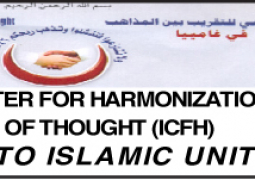In his book, Al-Adab ash-Shar’iah, Ibn Muflih writes that Shaikh Taqiyyuddin Ibn Taymiyyah said: “A credible Jew or Christian who has medical expertise may treat a sick Muslim.
Such a person may, likewise, be entrusted with funds or other financial transactions, for Allah, the Exalted, says: ‘Among the People of the Book are some who, if entrusted with a hoard of gold, will (readily) pay it back; others, who, if entrusted with a single silver coin, will not repay it unless you constantly stand over them demanding it’.’’ (Qur’an 3.75) We find in a sound hadith that the Prophet, peace be upon him, hired a polytheist as a guide at the time of his migration to Madinah, so he entrusted him with his life and money. The people of the tribe of Khuza’ah, who were both Muslims and non-Muslims, acted as scouts for the Messenger of Allah, peace be upon him. It is also reported that the Prophet, peace be upon him, ordered Muslims to seek treatment from Al-Harith ibn Kaldah, who was a disbeliever. But when a Muslim physician with the expertise is available, one should seek his or her treatment and not turn to anyone else. The same applies when one has to entrust a person with funds or deal with him in business. If a Muslim has to confide in or turn to someone from the people of the Book for medical treatment, he may do so. It is not prohibited to befriend Jews and Christians. And when the Muslim has an opportunity to talk to them, he should address them in ways that are polite and sincere. Indeed, Allah, the Exalted, says: “And do not argue with the people of the Book, except in ways that are best.” Qur’an 29.46 In a hadith on the Treaty of Hudaibiyah, Abu Al-Khattab tells us that “the Prophet, peace be upon him, sent a man of the Khuza’ah tribe to gather intelligence, and the Prophet, peace be upon him, accepted his report despite the fact that he was a disbeliever.” This proves, according to Abu Al-Khattab, that it is quite permissible to take the advice of a non-believing physician for diagnosis and treatment, provided he is not suspected and his fidelity is not doubtful.
Permission for a Woman to Seek Medical Treatment from Men
In cases of necessity, it is permissible for a man to treat a woman, and for a woman to treat a man. Bukhari reports from Rubayyie’ bint Mu’awwizh ibn ‘Afra that she said: “We participated in battles with the Messenger of Allah, peace be upon him, and we (women) provided the people with water, looked after them, and brought the wounded and the dead back to Madinah.” (Bukhari, Chapter on “Can a Man Treat a Woman, or a Woman a Man?”) In his book, Al-Fath, Al-Hafiz writes: “When necessary, it is permissible to treat strangers with whom one is not related or not consanguine. Therefore, looking at, probing, and touching, etc., in such cases are also allowed.” In Al-Adab al-Shar’iah Ibn Muflih writes: “If a woman is sick and no female doctor is available, a male doctor may treat her. In such a case the doctor is permitted to examine her, including her genitals. The same applies to a male doctor treating a sick man. Ibn Hamdan says: “If a man is sick and there is no male doctor available to treat him, then he may be treated by a female doctor. She is permitted to examine him, including his genitals.” Al-Qadi writes: “A physician is permitted to look at a woman and her private parts in case of necessity. Likewise, if need be, a woman or a man is permitted to look at the private parts of a man.
Prohibition of Using Amulets
The Messenger of Allah, peace be upon him, prohibited the use of amulets. ‘Uqbah ibn ‘Amir narrates that the Messenger of Allah, peace be upon him, said: “If anyone wears an amulet, may Allah not help him in fulfilling his wish. If anyone wears a sea-shell around his neck, may Allah give him no peace.” (Narrated by Ahmad and Al-Hakim who consider it a sound hadith) An amulet (Tamimah) is a string of shells or beads that the Arabs used to put around their children ‘ s necks, believing that it would protect them from the evil eye. Islam abolished this superstitious practice. The Messenger of Allah, peace be upon him, prayed against those who wore an amulet out of superstitious belief. It is reported from Ibn Mas’ud that “once, when he entered his home, he noticed his wife wearing a knotted object round her neck. He took it away and broke it. Then he remarked: ‘The family of ‘Abdullah has become so arrogant that they now associate with Allah those for whom He has sent down no authority.’ Then, he added: ‘I have heard the Messenger of Allah, peace be upon him, saying: ‘Verily, incantations, amulets, and love charms are acts of shirk (associating false gods with Allah).’ The people said: ‘O Abu Abdullah! We are familiar with incantations and amulets, but what is a love charm (al-tawlah)’?’He replied: ‘It is a sort of magical formula by which women sought to gain their husbands’ love’.” (Related by Al-Hakim and Ibn Hibban, and both consider it a sahih hadith) ‘Imran ibn Hasin reports that “the Messenger of Allah, peace be upon him, saw a man wearing a bracelet of copper on his arm. The Prophet, peace be upon him, exclaimed to him: ‘Woe be to you’ What is this? ‘The man replied: ‘I am suffering from weakness (al-wahinah).’ (Al-wahinah is a disease that causes pain in the shoulders and hands. The man was wearing a copper bracelet believing it would relieve his pain and suffering. The Prophet, peace be upon him, prohibited him from wearing it because he regarded it as an amulet) The Prophet, peace be upon him, said: ‘It will give you nothing but pain. Throw it away. Had you died while wearing it, you would never have achieved salvation’.” (Narrated by Ahmad) ‘Isa ibn Hamza said: “I went to see ‘Abdullah ibn Hakim and his face was red due to high fever. I said to him: ‘Why don’t you use an amulet?’ He said: ‘We seek refuge with Allah from it. The Messenger of Allah, peace be upon him, said: “Whoever wears anything as an amulet will be entrusted to it”.”’ (Abu Daw’ud)
Use of Incantation and Supplications in the Treatment
The use of incantation and supplications is allowed for treatment, provided their content is the remembrance of Allah and they are written in a comprehensible language. Otherwise their content might well contain something polytheistic without one being aware of it. ‘Awf ibn Malik reported: “We practiced incantation in the pre-lslamic days so we asked the Messenger of Allah, ‘What is your opinion about it?’ He said: ‘Let me see your incantations. There is nothing wrong with the incantation that does not contain any polytheistic statements’.” (Muslim and Abu Daw-ud) Ar-Rabi ‘ says: “I asked Ash-Shafi ‘ i about incantation. He replied: ‘There is nothing wrong in using the Qur’an for incantation or any other words that contain Allah’s remembrance.’ Then I asked him: ‘Is it permissible for Muslims to approach the Christians and the Jews for incantation? ‘ Ash-Shafi’i replied: ‘Yes, provided they use the revelation from Allah and words that contain His remembrance’.
Some Supplications Found in Hadith
‘Aishah reports that the Prophet, peace be upon him, used to seek refuge in Allah for some of his family members. He used to touch them with his right hand, saying: Allahahuma Rabbin nas azhhabal ba’sa, ashfi wa antashafi, la shifa’ illa shifa’uka shifa’ la yughadiru saqma “O Allah! The Sustainer of mankind! Remove the illness, cure the disease. You are the One Who cures. There is no cure except Your cure. Grant (us) a cure that leaves no illness.” (Bukhari and Muslim) ‘Uthman ibn Abu Al-’As relates that “once he complained of pain in his body to Allah’s Messenger, peace be upon him. The Messenger of Allah, peace be upon him, said: ‘Put your hand where you feel pain in your body and say, “Bismillah (in the name of Allah),” and say, “A ‘uzhu bi ‘izzatillah wa qudratihi min sharri ma ajidu wa uhazhiru (I seek refuge in the might of Allah and in His Power from the evil that I find and that I fear),” seven times’.” ‘Uthman continued: “I did that a few times and Allah removed my pain. I always advised my family and others to do the same.” (Muslim) Muhammad ibn Salim reported: “Thabit Al-Banani said to me: ‘O Muhammad! When you have any pain, put your hand where you feel pain, then say: Bismallaha’uzhu bi’izatillah min shari ma ajidu min waj’i hazha “In the Name of Allah! I seek refuge in Allah’s might from the evil of this pain. “Then remove your hand, and repeat the same for an odd number of times. Then he said to me that Anas ibn Malik had told him that Allah’s Messenger, peace be upon him, had taught this to him.” (Tirmizhi) ‘Abdullah ibn ‘Abbas reported that the Prophet, peace be upon him, said: “When someone visits a sick person whose time of death has not come, and says seven times: As’alu Allah al ‘azim Rabbil ‘arshil azim an yshfiaka ‘I ask Allah, the Mighty, the Lord of the mighty throne, to cure you,’Allah will cure him of that illness.” (Reported by Abu Daw’ud and Tirmizhi, who says it is a hasan (good) hadith. Al-Hakim says that it is sound according to Bukhari’s criteria) ‘Abdullah ibn ‘Abbas also narrates that “the Prophet, peace be upon him, used to seek protection for Al-Hasan and Al-Hussain (his grandsons) with the words: “A’uzhukuma bi kalamatillahi tamah min kulli shaitanin wa hamatin wa min kulli ‘ainin lamatin” ‘I seek protection for you with Allah’s perfect words from every satan and crawling creature and every evil eye.’ He also added: ‘Your father (Ibrahim) sought protection for Ismai’l and Ishaq with these same words’.” (Bukhari) Sa’d ibn Abi Waqqas reports that “the Prophet, peace be upon him, visited him while he was sick and said: ‘O Allah, make Sa’d well! O Allah, make Sa’d well! Make Sa’d well!”’ (Muslim)
TO BE CONTINUED



